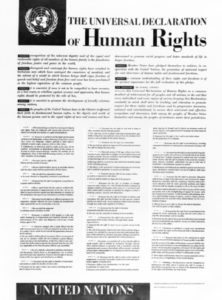

They are also about the decisions we make and situations we experience on a daily basis. Watch our video to find out why human rights are for everybody: Why should you care about human rights?
#UNIVERSAL DECLARATION OF HUMAN RIGHTS FREE#
They include the right to asylum, the right to freedom from torture, the right to free speech and the right to education. There are 30 rights and freedoms set out by the United Nations in the Universal Declaration of Human Rights (UDHR). In 1948, the United Nations Universal Declaration of Human Rights was established to do exactly that. The Universal Declaration of Human RightsĪfter the horrors of the Second World War, a document was written specifically to outline and protect every single human being’s basic rights. But human rights are not just abstract concepts – they are defined and protected by law. These rights and freedoms are based on values like dignity, fairness, equality, respect and independence.

Human rights can never be taken away, but they can sometimes be restricted – for example if a person breaks the law, or in the interests of national security. Human rights apply no matter where you are from, what you believe in, or how you choose to live your life. The GCC accordingly urges the global community to strengthen the international refugee protection system, and consider adopting a new international convention on refugees and migrants.Human rights are the fundamental rights and freedoms that belong to every single one of us, anywhere in the world. Moreover, in a world where 60 million individuals are displaced from their homes and 20 million are refugees, the rights of migrants and stateless persons have become - as was true in the upheavals following the Second World War - a matter of vital importance.

Recognizing that the rights of children are routinely violated across the globe - with 15 million girls married each year before their 18th birthday, and 8.7 million children in modern slavery - the Commission proposes the creation of an International Children's Court, with the power to receive and adjudicate petitions from children and their representatives on violations of the Convention on the Rights of the Child, to issue legally binding judgments, and to investigate areas of concern such as child labor, child slavery, and child marriage. Some of these call for upholding particular rights in new ways. The Commission also advances recommendations that highlight the urgent need to strengthen human rights implementation in the twenty-first century.


 0 kommentar(er)
0 kommentar(er)
